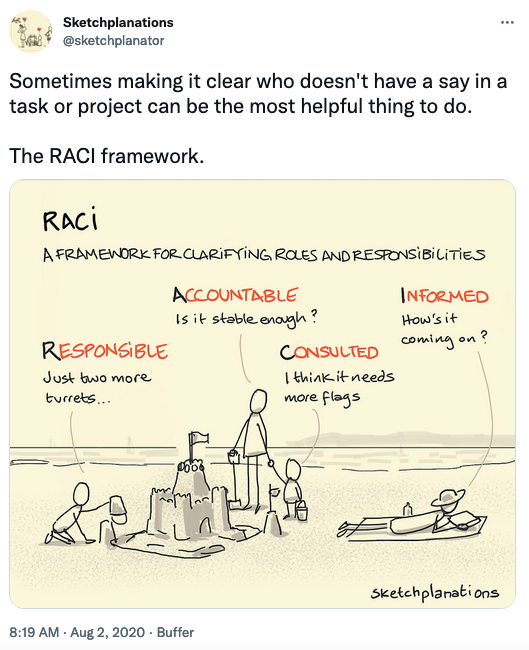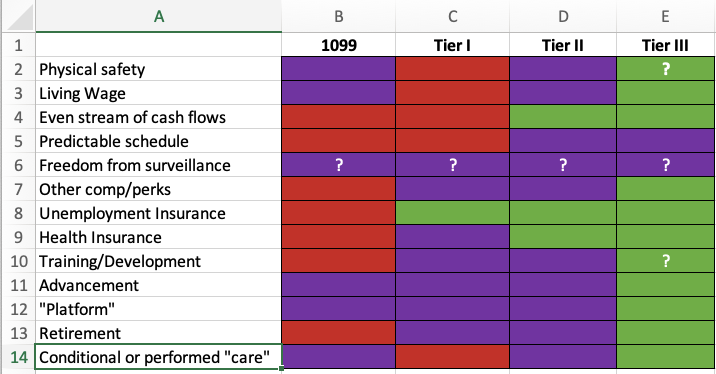Summer Reading, 2020: On Management #44
Thank you so much for reading my newsletter, and welcome to new subscribers.
Last week, Substack sent out some privacy policy emails. They mistakenly included hundreds of people on an open cc. If you received one of these emails, I apologize.
I’ve made mistakes with mass emails myself, so my first reaction was, “Ouch.”
Covid is stretching us all, and things are difficult.
And, I’m disappointed that Substack has not been forthcoming in its public description of the problem, or its magnitude.
However, I’m the one who trusted my newsletter to an unproven startup. While I didn’t create the error, I am responsible.
I am sorry, and will be working to figure out how this won’t happen to anyone who receives this email in the future.
You’ve got to be better
If you’re reading this, you may be in tech, media, VC, not-for-profit, higher education, or beyond. You may lead a team, HR, an organization — or you own a business. You’re probably in the US, Canada, the UK, or Australia. Or not.
Hello. Based on what I’m seeing out there, I usually feel competent to share information that’s widely useful.
Right now, I have little sense for a universal experience. Even here in the US. Even in my close cohort.
Some are safely working remotely, maybe challenged by home-work boundaries and child care. Others have been pressured to return to workplaces that may not be safe.
They’ve have been let go, or work in organizations that are subject to rolling layoffs. Some are in job-search mode. Others have gotten sick.
Right now, I only see one universal truth: you’ve got to be a better manager.
There’s no panacea. There’s not a training, coach, or book, that’s got you covered for this moment.
It’s time to practice what you already know. Start by looking in the mirror:
- Be sure that people know what’s expected. Are you talking with people individually, and aligning goals with current priorities? Do team members have goals? Are you providing regular feedback?
- Get a handle on key projects and objectives. Does everyone know their role in moving a project or key objective across the finish line?

- Understand where your team is under-resourced. What projects or processes are in trouble? Can anything be dropped? How can your support make a difference?
- Identify, if you can, whether anyone is struggling personally. This is tough. So many have been taught to hide when we have problems. Does your organization have an Employee Assistance Program?
- When you have a management challenge, get help from a human. Can you list 3 experienced managers in your circle who will take your call? (Hint: your mom counts.)
- Get feedback. “What can I do more/less often to make your job easier,” is a great question to ask team members in 1:1s. You are having 1:1s, right?
One of your best tools is your own moral compass.
Are you doing the right thing? Is the way you’re being treated okay? Are you treating others as you wish to be treated?
“Normal” is gone. It’s gone for good. We can’t be waiting to go back there. Our choices, in aggregate, will co-create a new normal.
Make good choices.
Books books books and a movie
Even when business books are good, most are ephemeral — not classics. This is a hill I die on, again and again.
Imo, you’re better off reading broadly. And then asking, how will this help me to think or act like a (good) manager?
This year, some of my summer recommendations relate to the workplace and our current moment. Others are more atmospheric than prescriptive.
In The Gatekeepers: How the White House Chiefs of Staff Define Every Presidency (library) (Bookshop) author Chris Whipple uses interviews with 17 former Chiefs of Staff to describe the varied ups and downs of having un-seasoned operator step into an executive role.
In startup-land, it’s when someone who designs/engineers a product suddenly becomes a CEO. Sometimes they’ve never managed a team of any size or scope.
If you are this CEO, this book is for you. It’s also for this CEO’s team members and investors. There’s insight for anyone stepping into a stretch role, too.
It also sheds light on the clubby white male halls of power. Sponsorship, mentorship and power are all in foreground and background.
I try not to share recommendations you may be hearing elsewhere. Sorry not sorry about Big Friendship: How We Keep Each Other Close, by Aminatou Sow and Ann Friedman (library) (Bookshop).
Yes, it’s an unique view of friendship, in the context of a single friendship.
Leaders should check the chapter on Shine Theory. It’s the idea that your own personal excellence is lifted up by the excellence of those around you. Reciprocally supportive relationships and actions create a virtuous circle. In my words.
If you’re a manager, you should think, “I don’t shine if you don’t shine,” about your team members. Every. Single. Person. Even people you don’t like.
This is also a book for anyone who has formed a business partnership with a friend, or who has considered it. There’s and wise and raw perspective about race and our friendships.
The Assistant (Hulu) was the last film I saw in a movie theatre. It’s an unrelenting show, don’t tell, narrative about how people enter into systems of complicity at work.
There’s food for thought for anyone who has been in an organization where everyone has disregarded an elephant in the room.
That’s many of us.
I’ve already recommended Ling Ma’s Severance (library) (Bookshop). It’s here, again, because it’s about a young woman who continues to report to the office as a global pandemic unfolds.
Also, zombies.
I read The Southern Book Club’s Guide to Slaying Vampires (library) (Bookshop) and Valentine (library) (Bookshop) in quick succession, and they started a dialogue with one another in my mind.
One is genre, the other is literary fiction. Both are character-driven narratives about women seeking justice, below the Mason-Dixon line, in the waning 20th century.
Valentine, in particular, left me with a deep imprint of the impossible entwinement of misogyny and white supremacy.
Late last year, I turned on the car radio mid-Fresh Air. Attica Locke was recounting that attending a “plantation wedding” — wth?!! — led her to write The Cutting Season (library) (Bookshop), which I then read and loved.
The radio interview was about Heaven, My Home, (library) (Bookshop) the second in Locke’s Highway 59 Series, about Darren Matthews, a Black man and a Texas Ranger. Which I’m just starting this weekend, after finishing the first book of the series, Bluebird, Bluebird (library) (Bookshop)
I’ve written about my fondness for police procedurals. The best are novels of manners, about workplaces and working relationships. As the call rises to rethink/defund policing, I’m left wondering when, what, and how I should read in this genre.
Help
In one week in July, two people in my extended circle died deaths of despair.
Two more jagged holes in an unseeable fabric.
Check in with your team members and co-workers. Especially if you know that they’ve experienced depression, anxiety, chronic illness. Or if you’ve wondered whether they’re well-served by their alcohol or drug use.
Hug all of your people. Virtually, or irl if it’s safe.
If you’re in despair yourself, reach out. Depression may tell you that people won’t care. Or that your current circumstances are permanent.
Depression is a fucking liar.
You matter. You’re an entire universe; we need you here.
Crisis Text Line, text HOME to 74174
National Suicide Prevention Lifeline, 1-800-273-TALK (8255) or online chat
Alcoholics Anonymous/Narcotics Anonymous
A question
How can you and your team members gain access to confidential mental health services?
Links
Here are links to all of my recommendations — they are not affiliate links.
- The Assistant (Hulu)
- Big Friendship: How We Keep Each Other Close, by Aminatou Sow and Ann Friedman (library) (Bookshop)
- The Cutting Season, by Attica Locke (library) (Bookshop)
- The Gatekeepers: How the White House Chiefs of Staff Define Every Presidency, by Chris Whipple (library) (Bookshop)
- The Highway 59 Series: Bluebird, Bluebird (library) (Bookshop); Heaven My Home (library) (Bookshop)
- Severance, by Ling Ma (library) (Bookshop)
- The Southern Book Club’s Guide to Slaying Vampires, by Grady Hendrix (library) (Bookshop)
- Valentine, by Elizabeth Wetmore (library) (Bookshop)
I guess that I didn’t write a Summer Reading issue last year. But there were two in 2018, issues 29 and 30.
Thank you so much reading. Many thanks to supporting members for warm support of my newslettering habit.
And h/t to Alex Wykoff, who retweeted the RACI framework into my feed. H/t to Jane Marcus-Delgado for a primer on deaths of despair.
And many thanks to everyone who keeps me on my toes and learning, by sending me questions, suggestions, and awesome GIFs.
Reach out to your people.
May you and yours be healthy, safe, and free.
P.S. The last few issues:
- Warm Take: Ally. July 19, 2020 (paywalled)
- Warm Take: Bargaining. June 28, 2020 (now unpaywalled, if that’s a word)
- Warm Take: Feminine =/= Feminist. June 14 2020 (paywalled)
- Do the Right Thing: On Management #43
The paywall’s point — this newsletter is my own (very) mini-and-growing-UBI.





